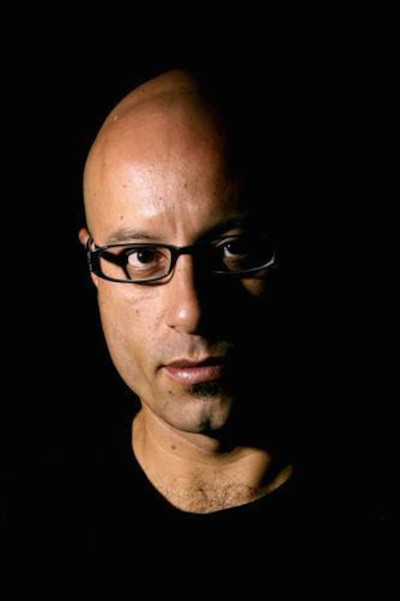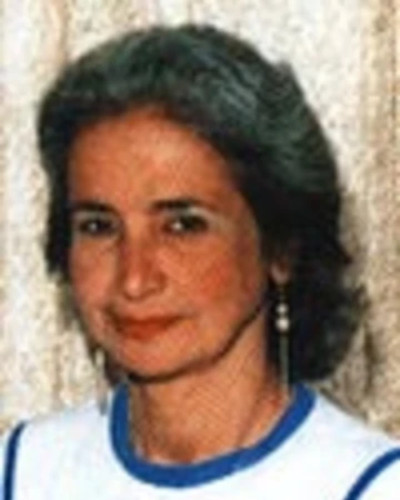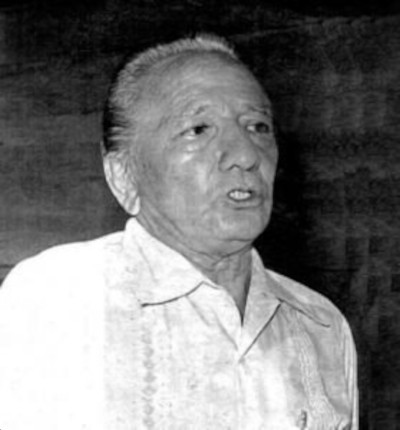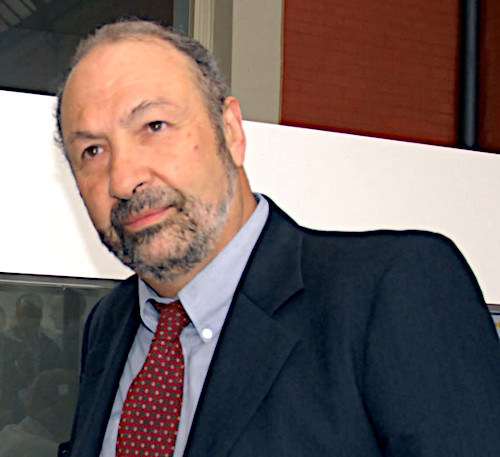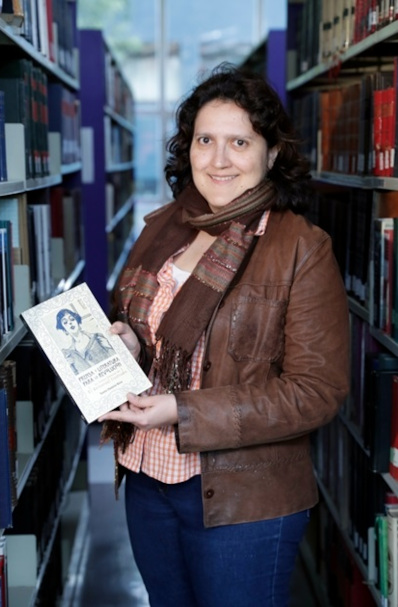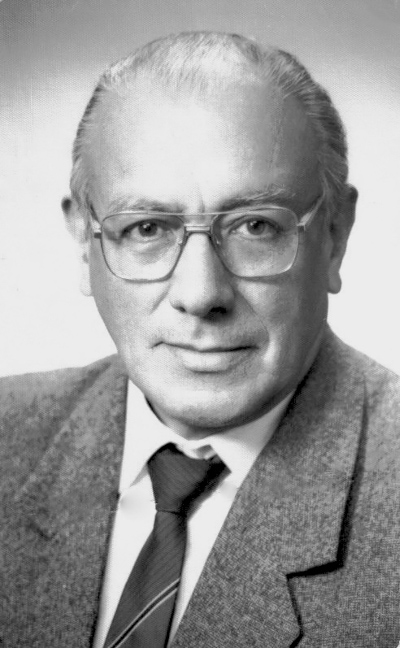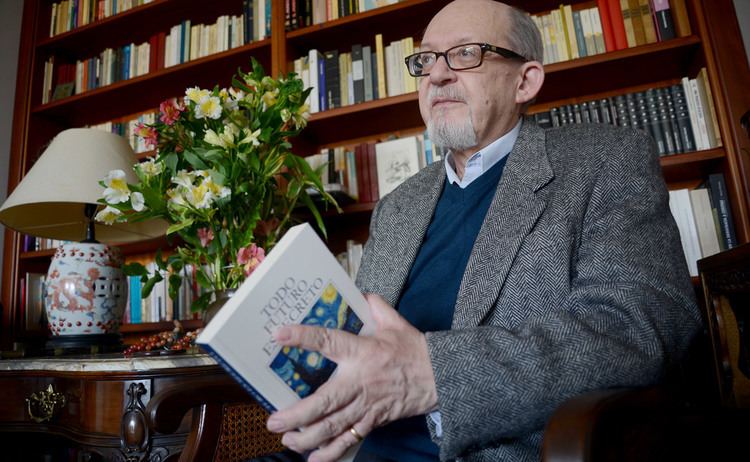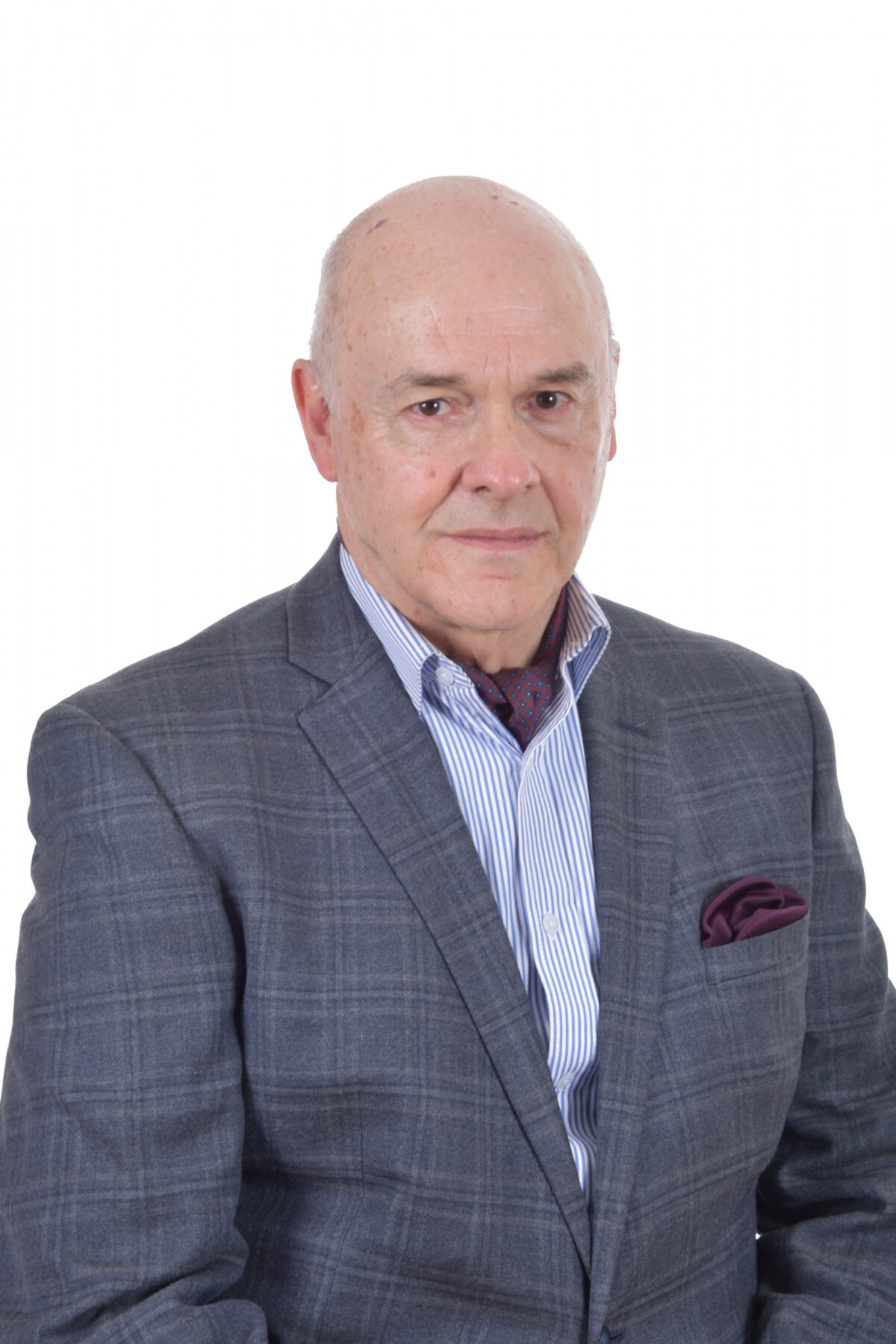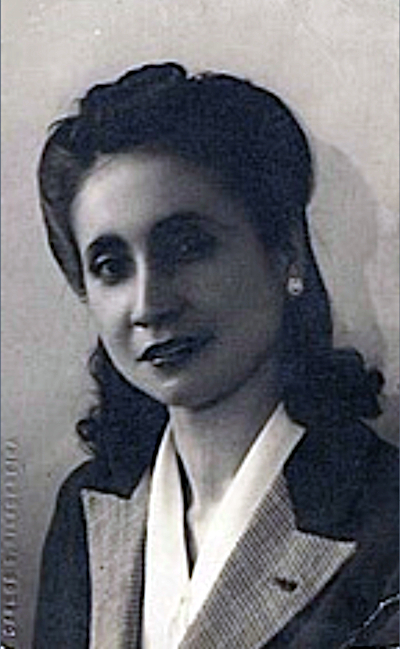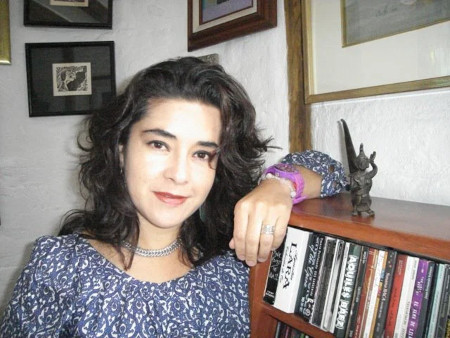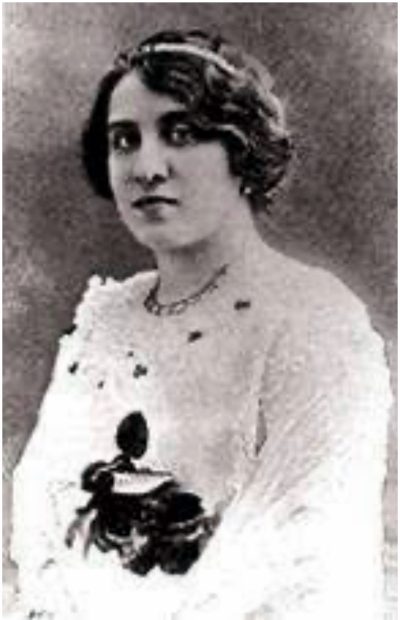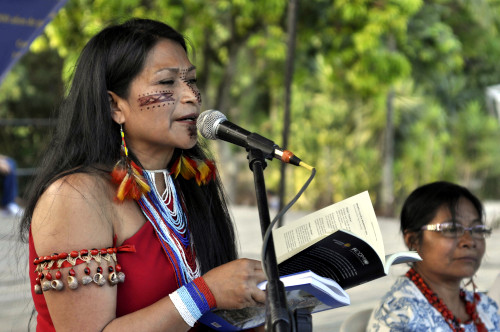Ney Yépez Cortés (Quito, 1968) is an Ecuadorian novelist, poet, journalist, songwriter, screenwriter, lecturer, and teacher of Tai Chi, Reiki and Qi Gong. He is best known as a science fiction, adventure and mystery writer. He published his first poems in 1990 in Ixo Facto, a surrealist literary magazine. He has since written 5 novels and 3 books of short stories. In 2001 he published his first book of short stories entitled “Mundos abiertos,” which was critically acclaimed. In 2006 he published his first novel “Las sombras de la Casa Mitre,” and 2009 he published its sequel “El árbol de las brujas.” His latest novel “El secreto de la reliquia sagrada,” a work of adventure and mystery, was published in 2019.
Continue reading “Ney Yépez Cortés”Posts
Eugenia Viteri
Blanca Eugenia Viteri Segura (Guayaquil, July 4, 1928 – Quito, September 21, 2023) is an Ecuadorian novelist, short story writer, anthologist, women’s rights activist, and teacher. Viteri has published over a dozen books including novels, short story collections, and anthologies. Her work has been translated into English, Russian, and Bulgarian. She has been a member of the House of Ecuadorian Culture since 1962. She founded the Manuela Sáenz Cultural Foundation in 1983. Through her work with the foundation, Viteri became one of the most important defenders of women’s rights in Ecuador. In 2008, President Rafael Correa honored her with the Rosa Campuzano National Prize. She was among the first to receive the newly created award, which recognizes the work of noteworthy Ecuadorian women.
Continue reading “Eugenia Viteri”Pedro Jorge Vera
Pedro Jorge Vera (Guayaquil, June 16, 1914 – Guayaquil, March 5, 1999) was an Ecuadorian journalist, novelist, short story writer, playwright, poet, university professor, and a politician from the Communist Party of Ecuador. He published and contributed to several controversial newspapers and magazines, such as “La Calle”, with the writer Alejandro Carrión, and “La Mañana”. He remained throughout his life a close friend of Cuban president Fidel Castro. Vera was the paternal uncle of Prima Ballerina Noralma Vera Arrata.
Continue reading “Pedro Jorge Vera”Javier Vásconez
Javier Vásconez (Quito, 1966) is an Ecuadorian novelist, short story writer, and editor. In 1989, his collection of short tales “El hombre de la mirada oblicua” [The Man with the Sideways Glance] won the Joaquín Gallegos Lara Prize, and in 1982 his book of short stories “Ciudad lejana” [A Distant City] was a finalist for the Casa de las Américas Prize (Cuba). His stories have been translated into other languages, including English, French, German, Swiss, Hebrew, Bulgarian, and Greek. In 2022, he was awarded the Eugenio Espejo Prize, which is Ecuador’s highest national literary award.
Continue reading “Javier Vásconez”Eduardo Varas
Eduardo Varas Carvajal (Guayaquil, 1979) is an Ecuadorian novelist, musician and journalist, currently living in Quito. He studied Social Communication at the Catholic University of Santiago de Guayaquil and was a member of Miguel Donoso Pareja’s Writer’s Workshop. He has worked for the newspapers El Comercio, El Universo, El Expreso, and El Telégrafo, as well as the magazines SoHo, Mundo Diners, and Ecuador Infinito. In 2007, he published “Conjeturas para una tarde,” a collection of short stories, and in 2008, he was included in the online anthology “El futuro no es nuestro,” along with several other Latin American short story writers. In 2010, he wrote the novel “Los descosidos.” In 2021, he won the Miguel Donoso Pareja Award for his short novel “Las tres versiones,” which was based on the true story of Ecuador’s youngest serial killer, Juan Fernando Hermosa. In 2021, he published his latest novel “Esas criaturas.”
Continue reading “Eduardo Varas”Yanna Hadatty
Yanna Hadatty Mora (Guayaquil, 1969) is an Ecuadorian essayist and short story writer. Haddatty has lived in Mexico since 1992, where she finished her higher education and worked as a professor. She received her doctorate in Ibero-American Literature from the Autonomous University of Mexico (UNAM), where she later worked as a professor and contemporary literature researcher. She also taught at the University of Sor Juana Cloister and the UAM Xochimilco. She is a full member of Ecuador’s House of Culture and the Executive Secretary of the Association of Ecuadorians in Mexico. She has been a member of Mexico’s National System of Researchers since 2005.
Continue reading “Yanna Hadatty”Luis Alberto Costales
Luis Alberto Costales Cazar (Riobamba, December 24, 1926 – Ibidem, February 1, 2006) was an Ecuadorian poet, writer, historian, philosopher, teacher, orator, farmer, and politician. Renowned as a multifaceted figure, Costales left an indelible mark on Ecuadorian literature and politics. His literary repertoire includes notable works such as “Bucólicas y Una Vida Simple,” “Sobre el Pomo de la Tierra,” “Exiliado en el verso,” and “Rutas de Sombra y de Sol.” Notably, he co-founded the Democratic Left Party and played a significant role in shaping the political landscape of Ecuador. Throughout his life, Costales remained dedicated to his principles, promoting ideals of love for his city, patriotism, and deep moral values.
Continue reading “Luis Alberto Costales”Juan Andrade Heymann
Juan Andrade Heymann (Quito, December 18, 1945) is an Ecuadorian writer, novelist, short story writer, poet, and playwright. His short story El lagarto en la mano (1965) and his novel Las tertulias de San Li Tun (1993) expressed social change.
Continue reading “Juan Andrade Heymann”Luis Aguilar Monsalve
Luis Aguilar Monsalve (Cuenca, October 7, 1942) is an Ecuadorian writer, literary critic and university professor. He is a numerary member of the Ecuadorian Language Academy. He has written over 20 books of short stories. He also authored a novel titled “En busca de sor Edwina Marie” (2018). As editor, he published a Spanish/English bilingual anthology of Ecuadorian short stories. He has taught at universities in the United States and Ecuador. He is professor emeritus at Hanover College.
Continue reading “Luis Aguilar Monsalve”Raquel Verdesoto
Raquel Verdesoto Salgado de Romo Dávila
Continue reading “Raquel Verdesoto”Sonia Romo Verdesoto
Sonia Romo Verdesoto de Augustín is an Ecuadorian poet and diplomat. She was the only female member of the Tzantzismo movement in Ecuador during the 1960s. Verdesoto served as the Ecuadorian consul to Haiti.
Role in Tzantzismo
Sonia Romo Verdesoto was interviewed by Susana Freire García for the book Tzantzismo: tierno e insolente (2008; Tzantzismo: Tender and Insolent), where she discussed her role in the movement and its influence and effects on Ecuadorian culture
Works
Ternura del aire (1963).
Aleyda Quevedo Rojas
Aleyda Quevedo Rojas (Quito, 1972) is an Ecuadorian poet and journalist. She is regarded as an important voice in contemporary Latin American poetry. Among her best-known works are the poems “Algunas rosas verdes” (1996), for which she won that year’s Jorge Carrera Andrade Award, and “Soy mi cuerpo” (2006), in which she uses the human figure as an escape from the fears and anguish provoked by death. The latter book and another one, “Jardín de dagas” (2013), were translated into French. In 2017, the House of Ecuadorian Culture published the book “Cierta manera de la luz sobre el cuerpo,” a compilation of her poems up to that point.
Continue reading “Aleyda Quevedo Rojas“María Piedad Castillo de Levi
María Piedad Castillo de Levi (Guayaquil, July 6, 1888 – Quito, March 4, 1962) she was an Ecuadorian writer, poet, and journalist. She is also regarded as an important feminist who fought for women’s suffrage in Ecuador, for which she was targeted by the authorities. Castillo traveled to Paris to study in the Faculty of Philosophy and Letters at the Sorbonne. On her return to Ecuador, she began working for the publication El Telégrafo Literario. She wrote numerous poems, which appeared both in El Telégrafo and in various magazines. In June 1933, she funded the magazine Nuevos Horizontes with a group of fellow feminists. It served as the media organ of the Women’s Legion of Popular Education, an organization that worked to improve the rights of women workers. They also created a radio program, which the presidential candidate José María Velasco Ibarra appeared on in 1934. In 1935, Castillo was a candidate for minister of education, and El Telégrafo supported her candidacy. But women were still broadly excluded from Ecuadorian politics at the time, so she was denied the position. She served as the Ecuadorian delegate to the Inter-American Commission of Women for many years, beginning in 1940. She also joined the House of Ecuadorian Culture in Guayas and Pichincha beginning in 1946. Castillo traveled widely, spending long periods in the United States and even working as a foreign correspondent in Germany. She was a member of the National Press Club in Washington D.C. In recognition of her poetic work, the House of Ecuadorian Culture published her collection “Poemas de Ayer y de Hoy” in 1962.
Continue reading “María Piedad Castillo de Levi”María Clara Sharupi Jua
María Clara Sharupi Jua (Morona Santiago, 1964) is an Ecuadorian writer, poet, and translator, who writes in Spanish and Shuar, an indigenous language of Ecuador’s Amazon basin. She writes poetry in Shuar, while translating it into Spanish in order to reach a wider audience. She co-wrote the book “Amanece en nuestras vidas” (2011), the first anthology of poetry from Ecuadorian indigeneous women writers, and wrote the short story collection “Tarimiat” (2019), which was written in Shuar, Spanish, and English. Sharupi Jua also works as a translator and radio and television presenter in Shuar and Spanish. She was a member of the translation team that worked on the official Shuar translation of Ecuador’s Constitution. She lives in Quito, where she has also worked for the Ministry of Foreign Affairs and Migration on indigenous issues.
Continue reading “María Clara Sharupi Jua”Karina Galvez
Karina Galvez (Guayaquil, July 7, 1964) is an award-winning poet with Ecuadorian and American citizenship. She has lived in Orange County, California since 1985. In 1995, she published her book “Karina Gálvez – Poesía y Cantares”[Karina Galvez – Poetry and Songs], which includes both English and Spanish versions of her poems with a prologue written by León Roldós Aguilera, Ecuador’s former vice president. She is also a songwriter and author of children’s poems and short stories. Her Spanish poems have been translated into English, French, Italian, Portuguese, Romanian, Bulgarian, Slovene, and Czech.
Continue reading “Karina Galvez”
